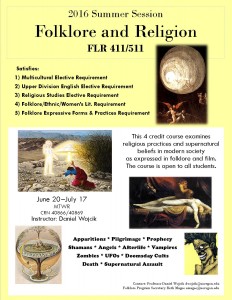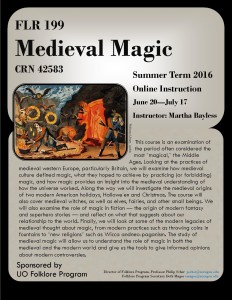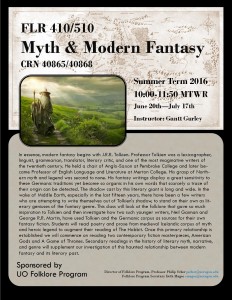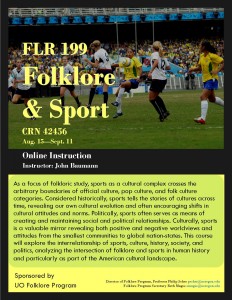Check Out These Summer Folklore Courses !!
Summer is coming, and the UO Folklore Program is offering a number of great courses for undergraduates and graduates!!
Summer Session 6/20-7/17
Folklore and Religion w/ Dr. Dan Wojcik
FLR 411/511 CRN 40866
MTWR 12:00 – 1:50
FEN 105
This course explores religious practices and supernatural beliefs in modern society as expressed in folklore and film. We will examine religion and spirituality as it is “lived,” focusing primarily on beliefs and practices that are informally learned and generally unsanctioned by institutional doctrines and authorities. The course is organized to reflect particular topics and areas of research that have preoccupied folklorists, and we will explore the issues and perspectives that have informed their studies. The role of folklore in peoples’ religious lives will be explored through the analysis of narratives, rituals, beliefs, customs, celebrations, pilgrimages, trance states, and numinous experiences.
Myth and Modern Fantasy w/ Dr. Gantt Gurley
FLR 410/510 CRN 40865
MTWR 10:00 – 11:50
PLC 189
This class will look at the folklore that gave so much inspiration to modern fantasy master J.R.R. Tolkien and then investigate how two younger writers, Neil Gaiman and George R.R. Martin, have used Toelkien and the Germanic corpus as sources for their own fantasy fiction. Students will read poetry and prose from medieval Icelandic corpus of myth and heroic legend to augment their reading of The Hobbit, followed by readings of American Gods and A Game of Thrones. Secondary readings in the history of literary myth, narrative, and genre will supplement our investigation of the haunted relationship between modern fantasy and its literary past.
ONLINE COURSES 6/20-7/17
Medieval Magic w/ Dr. Martha Bayless
FLR 199 CRN 42583
This course is an examination of the period often considered the most “magical,” the Middle Ages. Looking at the practices of medieval western Europe, particularly Britain, we will examine how medieval culture defined magic, what they hoped to achieve by practicing (or forbidding) magic, and how magic provides an insight into the medieval understanding of how the universe worked. Along the way we will investigate the medieval origins of two modern American holidays, Hallowe’en and Christmas. The course will also cover medieval witches, as well as elves, fairies, and other small beings. We will also examine the role of magic in fiction – the origin of modern fantasy and superhero stories – and reflect on what that suggests about our relationship to the world. Finally, we will look at some of the modern legacies of medieval thought about magic, from modern practices such as throwing coins in fountains to “new religions” such as Wicca and neopaganism. The study of medieval magic will allow us to understand the role of magic in both the medieval and the modern world and give us the tools to give informed opinions about modern controversies.
ONLINE COURSE 8/15 – 9/11
Folklore and Sport w/ Dr. John Baumann
FLR 199 CRN 42456
As a focus of folkloric study, sports as a cultural complex crosses the arbitrary boundaries of official culture, pop culture, and folk culture categories. Considered historically, sports tells the stories of cultures across time, revealing our own cultural evolution and often encouraging shifts in cultural attitudes and norms. Politically, sports often serves as means of creating and maintaining social and political relationships. Culturally, sports is a valuable mirror revealing both positive and negative worldviews and attitudes from the smallest communities to global nation-states. This course will explore the interrelationship of sports, culture, history, society, and politics, analyzing the intersection of folklore and sports in human history and particularly as part of the American cultural landscape.
Additional ONLINE COURSES
Introduction to Folklore w/ Dr. John Baumann
FLR 250 CRN 42288 6/20 – 7/17
FLR 250 CRN 40861 7/18 – 8/14
This course explores how people use creative forms to bring meaning to their day-to-day lives and negotiate their identities and relationships with other people. We will examine varied types of folklore forms and folklore groups, the meanings they have for the people who create them, how they function, and relationships between folklore and social issues. In addition to learning about folklore, students will develop critical thinking and research skills and work to present their thoughts through clear and rational writing.



